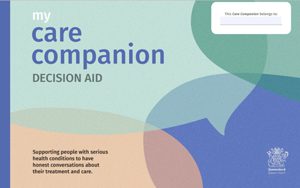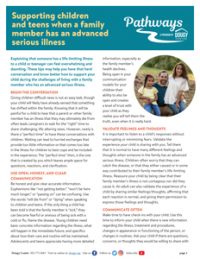Even though death is the expected outcome for everyone with a life-limiting illness, most people have very little idea of what to expect when someone is dying. We prepare for major life events like marriage, the birth of children and retirement, yet we often don’t prepare for our own death. As a result, when the end comes, it can sometimes feel sudden instead of expected and we can feel unprepared.
Having a sense of the timeline to death and knowing what to expect can help both the person dying and those witnessing to feel more in control, co-ordinate care and choose how to spend their remaining time.
CareSearch has a helpful factsheet and video on what to expect at the end as someone moves towards death.
Talking with your health care team about what’s right for you.
As we move towards the end, there are things for us to consider. For example, where would you like to be cared for at the end? Where would you like to die? Are medications and treatments still helping? Does your carer need more help?
Navigating the complex journey of living with a life-limiting illness can often feel overwhelming. Queensland Health has developed the Care Companion, a patient decision aid that supports shared decision-making for people with serious health conditions. The Care Companion was developed to facilitate honest conversations and guide decisions with the healthcare team about treatment and care and to help all involved to:
- Understand the person’s health condition and what might happen in the future.
- Understand the person’s values and preferences.
- Understand the benefits, risks and unknowns of available treatment and care options.
- Decide on the best option based on what is important to the person.
Hopefully you will have already completed the Care Companion when you received your life-limiting diagnosis. As you move towards death, it will be important to review this aid.
If you haven’t completed the Care Companion, it’s not too late.
- Download the full the Care Companion here.
There are also additional resources, including shorter/simplified versions and guides for how to use the Care Companion.
Informing others
A part of preparing for death is letting those important to you know what is happening. Knowing what to expect, and honest communication about this with those that matter, allows for a greater sense of control and reduces uncertainty and anxiety.
Many families will want to be with the person in their final days and some people may need to travel. Keeping people updated on what is happening allows them to make decisions about how they would like to be involved in these final days.
Informing children
Like adults, children of all ages need time to prepare for the death of someone close to them. While there is no easy way to have this conversation, it is important to let them know what is happening. The Dougy Center has produced a helpful fact sheet on supporting children and teens when a family member has an advanced serious illness. The fact sheet provides tips on how to begin the conversation, the importance of open, honest, clear, and frequent communication and validating children’s feelings and thoughts.


